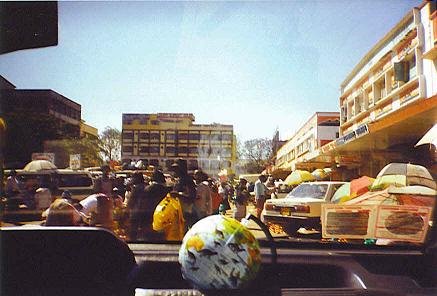OK, so I guess we could have gone with a slightly more "down to earth" title....but, hey? Just had to get the sillies out of my system, you wont hold it against me will you? Most of the time my family gets the brunt of my shenanigans, but seeing as how everyone else is asleep, guess that will have to do for now...
Anyhow, as promised I did get a chance to revisit the DENI Africa website for a deeper understanding of this initiative. Thanks Mr. Emeka Okafor! Sijui, you too! As it stands here is my understanding of what makes this a most unique proposition, followed by a description from the DENI Africa site:
One could say many things about DENI Africa. In fact, they could fall under at least four of the most commonly used labels on the Benin Epilogue-Africa Bloggers, Friends of African Business, African Diaspora Investment, Business News from Africa. But this in itself is not really why we are discussing them today. The main reason is the sheer amount of creativity that the facilitators of this program used just in developing this strategy for mobilizing the resources found amongst Africa's Diaspora. The acronym DENI, stands for Direct Expatriates Nationals Investment.
In a nutshell what DENI Africa was designed to do is to harness the African Diaspora's financial resources and channel them into debt reduction for Africa's countries which fall under the Highly Indebted Poor Countries classification.
Below are a few excerpts from DENI Africa:
"...To stimulate the private sector and the African economies, DENI requires that African nationals overseas buy up the Paris Club debt at a price acceptable to both sides. The lower the price the larger the amount of debt that can be retired. The goal is to liquidate a credible amount of the Paris Club debt and return the continent to a sustainable basis..."
Here is another:
This represents genius in that it is only one solution, but it addresses so many economic challenges that some of Africa's poorer nations face. Here a few ways that it addresses some of Africa's major challenges:"...The Direct Expatriate Nationals Investment (DENI**) model was originally designed as a Debt Relief and Poverty Reduction program but has since morphed into Enhanced DENI as a Poverty Reduction and External Resource Mobilization Program for countries that have received massive debt cancellation from the HIPC Program. Therefore, of the three applications of DENI, namely: (a) debt relief (b) poverty reduction and (c) external resource mobilization, only (b) and (c) remain enduringly valid for purposes of Enhanced DENI which is designed to turn a country’s liabilities into assets. Already, 14 African countries have received bilateral and multilateral debt cancellations and qualify for Enhanced DENI.
The Ingenuity of DENI is that it is a debt conversion in its impact but totally original in concept. Unlike other proposals that are out there in the marketplace of ideas, DENI is a people’s solution to the intractable twin problem of debt Relief and Poverty reduction that has bedeviled Africa for so long with no end in sight. The program is based on mobilizing ordinary African nationals living in North America and Western Europe as well as those scattered elsewhere around the globe to buy out the official debt owed to Paris Club (and other creditors if available) at a negotiated price with debt vouchers (in modest amounts) that are redeemable at home in a variety of local assets but not in local currency. DENI requires that each country’s nationals address their own country’s debt, meaning Nigerians for Nigerian debt, Senegalese for Senegalese debt, Kenyans for Kenyan debt and so on, down the line. There will be no cross-border purchases..."
- Freeing up government funds from debt service
- It aims to reverse capital flight
- This can improve the international credit rating of Africa's HIPC nations
- Enhancing democratic institutions, through transparency
It is centered on a wholly fair and objective approach, which allows African expatriates in Canada, the US, Europe, and any other continent outside of Africa to purchase assets such as shares in state owned parastatals by buying debt vouchers. The author of this ingenious approach to debt retirement is Frederick Kwoba, a Massachusetts resident-by way of Ghana. My understanding as to the status of this program is that it is still in it's beginning stages. I believe that the African countries who have signed on, to date, are Nigeria, Senegal, Ghana, and Kenya. Hopefully Mr. Emeka Okafor, who is both a very prominent Africa blogger and also a facilitator of DENI Africa may help to clarify just a few minor details. Questions like 1) who are the African countries that have signed on to the concept? 2)what stage of development is the program in now? 3) when can Diaspora investors get started? 4) what has been the reaction of the Paris Club to this proposal?
In closing, I would like to say that, to me, this effort represents one of the most practical and far reaching approaches to economic development and poverty reduction that I have learned about. Additionally, when it comes to mobilizing the investment of Africa's Diaspora this could easily become the standard by which all other similar efforts are measured. Once again, I would like to thank Sijui and Mr. Emeka Okafor for mentioning DENI Africa in their recent comments here-thanks a lot, you two!
Of course, I love your comments. But, if you can't comment at this particular time- but would like to let us know that you were here; please sign and View my guestbook







0 comments:
Post a Comment